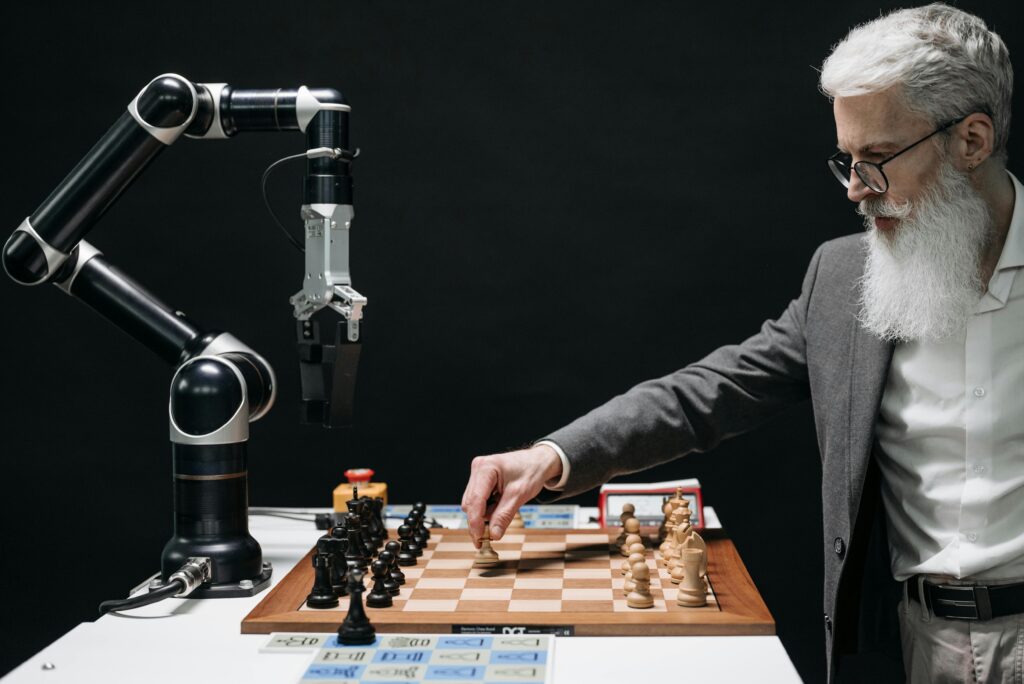As artificial intelligence progresses, the question arises: what distinguishes us as humans, and why is it important?
Artificial intelligence (AI) is becoming smarter, quicker, and more intertwined into our daily lives. It can replicate human speech, diagnose illnesses, create artwork, and even pass professional tests. AI-powered assistants, chatbots, and agents will soon be so convincing that many consumers will be unsure whether they are engaging with a human or a machine.
However, as AI advances and becomes increasingly integrated into society, it poses an important question: what genuinely defines us as humans, and why does it matter?
Why Should We Care About Human-Machine Differences?
In a future when artificial intelligence can copy our speech, automate our judgments, and even recreate emotions, knowing what distinguishes us is more than simply philosophical. It’s quite practical. Knowing what distinguishes us from intelligent robots impacts how we lead, connect, and navigate an increasingly digital environment, all while maintaining the meaning of life.
Knowing what distinguishes us as humans allows us to safeguard and even increase our most valued strengths—creativity, emotional intelligence, lived experiences, and sense of purpose—so that we may rise above AI and control the future rather than be shaped by it.
Here are six “irreplaceable human attributes,” or “IHAs,” as I term them:
1. We Feel. Artificial Intelligence Simulates
Artificial intelligence is capable of recognizing emotions. It can tell if someone is pleased, sad, or furious based on their facial expressions, tone of voice, and body language. However, AI does not have the ability to “feel” anything. It doesn’t feel happy when it solves a problem or sad when it loses something. It may be able to define such sensations intellectually, but it is not the same as genuinely feeling them.
Human emotions are inextricably linked to our biology, memories, and individual experiences. When we feel anything, it’s more than simply a data point; it’s a lived experience influenced by hormones, brain processes, and previous encounters. Artificial intelligence is capable of recognizing emotions. It can tell if someone is pleased, sad, or furious based on their facial expressions, tone of voice, and body language. However, AI does not have the ability to “feel” anything. It doesn’t feel happy when it solves a problem or sad when it loses something. It may be able to define such sensations intellectually, but it is not the same as genuinely feeling them.
Human emotions are inextricably linked to our biology, memories, and individual experiences. When we feel anything, it’s more than simply a data point; it’s a lived experience influenced by hormones, brain processes, and previous encounters.
.
2. We Have Real-Life Experiences. Artificial intelligence has data.
Experience is one of the most powerful forces that change us from the minute we are born. Every mistake, achievement, and challenge rewires our brains, influencing our future choices. This is what I’ve written extensively on, and I refer to it as experiential intelligence (XQ)—the capacity to use life experiences to grasp present difficulties, make judgments, and negotiate complex circumstances.
AI, on the other hand, is data-driven rather than experience-based. It can evaluate millions of previous instances, but it does not go through anything in real life. It does not learn from suffering, joy, failure, or achievement in the same way that people do. Experience is more than simply information; it is about personal development. Experience is one of the most powerful forces that change us from the minute we are born. Every mistake, achievement, and challenge rewires our brains, influencing our future choices. This is what I’ve written extensively on, and I refer to it as experiential intelligence (XQ)—the capacity to use life experiences to grasp present difficulties, make judgments, and negotiate complex circumstances.
.3. We Seek Meaning. Artificial Intelligence Follows Instructions.
Humans are wired to seek significance. We look for meaning in our jobs, relationships, and even the obstacles we confront. We tell tales to make sense of the world, find meaning in adversity, and connect our past with our future.
AI does not seek meaning—it just follows algorithms. It does not question the “why” behind what it does. It does not experience a sense of success or loss. It handles requests and provides replies, but it is unconcerned about the outcome other than achieving the pre-programmed objectives.
4. We Are Emotionally Creative. Artificial Intelligence Remixes.
AI can generate music, paintings, and even poetry. And people may indeed mistake AI-generated art for that created by humans. But AI doesn’t create in the way humans do. AI remixes and integrates, pulling from existing patterns in data. Human creativity, on the other hand, is deeply tied to emotions, personal experiences, and a desire to express something unique.
Great art, literature, and music have always originated from the human experience. The pain of heartbreak, the joy of discovery, the mystery of the unknown—these are things AI will never feel, so the emotion that underlies the products of human creativity will always remain uniquely human.
5. We Have Free Will. AI Has Code.
People make decisions. We alter our minds, defy logic, and engage in behavior that does not always make sense. We may choose charity over selfishness, forgiveness over vengeance, and creativity over conformity.
AI respects rules. No matter how sophisticated, it is always limited by its programming. It lacks wants, convictions, and the ability to think independently. While AI may simulate unpredictability, it does not make judgments outside of its own parameters.
6. All of us are aware. AI is a tool.
What’s the main difference? We’re conscious of ourselves. AI can perceive itself as AI, but it lacks awareness. It doesn’t think about its own existence, question its purpose, or ponder what happens next.
Human awareness remains a mystery. Scientists do not entirely grasp why we are conscious of ourselves. This self-awareness is central to what it is to be human.
Life in the Age of AI: A Guide
As AI continues to evolve, it will become harder to distinguish between what is real and what is artificial. AI will answer our questions, anticipate our needs, and simulate emotions so well that many people will mistake it for real human interaction.
As AI advances, the most important thing you can do isn’t to compete with it. It’s to double down on what makes you irreplaceably human.
Here’s how:
- Strengthen emotional intelligence: AI will never experience empathy in the same way as humans do. The capacity to connect, lead, and comprehend others will be a significant benefit.
- Leverage experiential intelligence: Your unique experiences provide insights that no AI can imitate. Stay present and aware of how your life experiences influence your ideas, wants, and behaviors.
- Seek meaning and purpose: We care about purpose, but AI does not. Engage in meaningful employment, relationships, and activities that reflect your ideals.
- Master creativity and innovation: While AI can produce ideas, people create with heart and purpose. Connecting emotions to innovative ideas might help you think beyond the box.
- Reveal and reconsider assumptions: AI is logical. Humans question, investigate, and challenge.
How to Retain Your Humanity in an Automated World
AI may be extremely useful and can appear lifelike. However, AI will most likely never give us what makes us human—authentic empathy, real love, meaningful purpose, and the emotional interactions and life experiences that create who we are and how we interpret the world.
As AI continues to permeate all aspects of life, the most essential thing we can do is acknowledge and embrace what distinguishes us, even as we utilize AI to make our lives more efficient and enjoyable. The more we accept and cherish our own and others’ emotional depth, lived experiences, and creative potential, the more likely we are to guarantee that technology serves mankind rather than the reverse. (Kaplan, 2025)
Citations & References:
Kaplan, S. (2023). Experiential Intelligence: Harness the Power of Experience for Personal and Business Breakthroughs. (Matt Holt Books).
Kaplan, S. (2023, November 17). AI is Learning How to Feel. Psychology Today.
Rafner, J., Beaty, R.E., Kaufman, J.C. et al. Creativity in the age of generative AI. Nat Hum Behav 7, 1836–1838 (2023).
Young C. Build a Winning AI Strategy for Your Business. Harvard Business Review. July 14, 2023.
All data cited from:






keep up the good work
Yes yes nice one